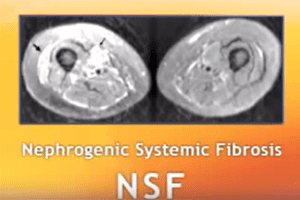
A Woman with NSF has Won a Battle with her Insurance Company. A Tennesee woman with Nephrogenic Systemic Fibrosis (NSF) has won a battle with her insurance company. After two years of litigation, a judge has ordered TennCare to pay for a treatment that might save her life. TennCare is Tennessee’s Medicaid managed care program that […]

A Woman with NSF has Won a Battle with her Insurance Company. A Tennesee woman with Nephrogenic Systemic Fibrosis (NSF) has won a battle with her insurance company. After two years of litigation, a judge has ordered TennCare to pay for a treatment that might save her life. TennCare is Tennessee’s Medicaid managed care program that provides health coverage for low-income children, pregnant women and disabled Tennesseans. TennCare had previously refused to cover the treatment – known as extracorporeal photopheresis – for Jeanie Deason because it was considered experimental.
NSF is a devastating condition that affects people with pre-existing kidney problems who have been exposed to gadolinium contrast dyes that are used in MRI procedures. There is currently no cure for NSF and no one understands its specific cause. The disorder is characterized by high blood pressure, burning, itching, swelling and hardening of the skin. Other symptoms include red or dark patches on the skin; pain deep in the hip bones or ribs and muscle weakness. NSF can progress to the point of causing severe stiffness in joints, and it can lead to death.
The evidence that gadolinium contrast agents play a role in the development of NSF is fast becoming irrefutable. Dutch scientists made the first connection between NSF and gadolinium in 2006. Since then, researchers at Yale University have reported that 95-percent of those with NSF had undergone a Magnetic Imaging Resonance (MRI) procedure that involved a gadolinium contrast dye two to three months before their symptoms appeared. Researchers at Massachusetts General Hospital also have found that kidney patients who had undergone MRIs with gadolinium contrast dyes were 10 times more likely to develop NSF than patient who had not been exposed to such agents.
In 2007, the Food & Drug Administration (FDA) asked the manufacturers of gadolinium contrast dyes to add a black box warning to the product labels about its association with NSF. The FDA also warned that patients with kidney disease should avoid gadolinium contrast agents.
Deason’s NSF has progressed to the point where her legs and right arm have become frozen in a bent position. During the fight with TennCare her condition deteriorated to the point where she needs someone to stay with her 24 hours a day. Now she spends her days in bed, limbs throbbing, only getting up when her parents help her go to the bathroom. She even had to miss her daughter’s graduation.
The treatment that Deason hopes will restore some normalcy to her life is called extracorporeal photopheresis. It involves removing blood from a patient’s body, exposing it to ultraviolet light and then re-infusing the blood into the body. It’s believed that the treated blood alters the body’s immune system so it can better fight the disease. It can cost around $8000 for one treatment.
Deason’s physician, Dr. John Zic, an assistant professor of dermatology at Vanderbilt University who has treated four patients in this way, told the Tennessean he has seen dramatic results. One patient who was initially unable to close her hand could use a pen to sign documents after three months of treatment. Another patient had significant joint stiffness and difficulty walking. After about seven months, the patient was walking without a significant limp. In all, three of Zic’s patients improved and one died because of issues with dialysis treatment, not because the treatment was ineffective
But despite the hope it holds for Deason, TennCare refused to pay or the treatment because it was experimental. Deason was forced to take the insurer to court, and in April, a judge in Davidson County Chancery Court overruled TennCare’s decision, saying even though it’s experimental it’s medically necessary. Recently, TennCare indicated it would not fight the judge’s ruling.
While Deason is pleased with the decision, she hopes it has not come too late. She hopes the treatment will eventually walk again, but she also knows her chances would have been better if she had started it two years ago.
If you’d like to know more about diseases go here: /diseases/
The personal injury attorneys at Parker Waichman LLP offer free, no-obligation case evaluations. For more information, fill out our online contact form or call 1-800-YOURLAWYER (1-800-968-7529).


